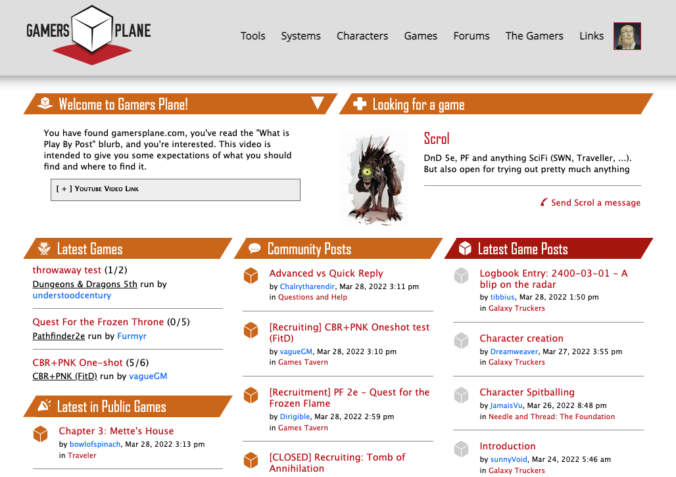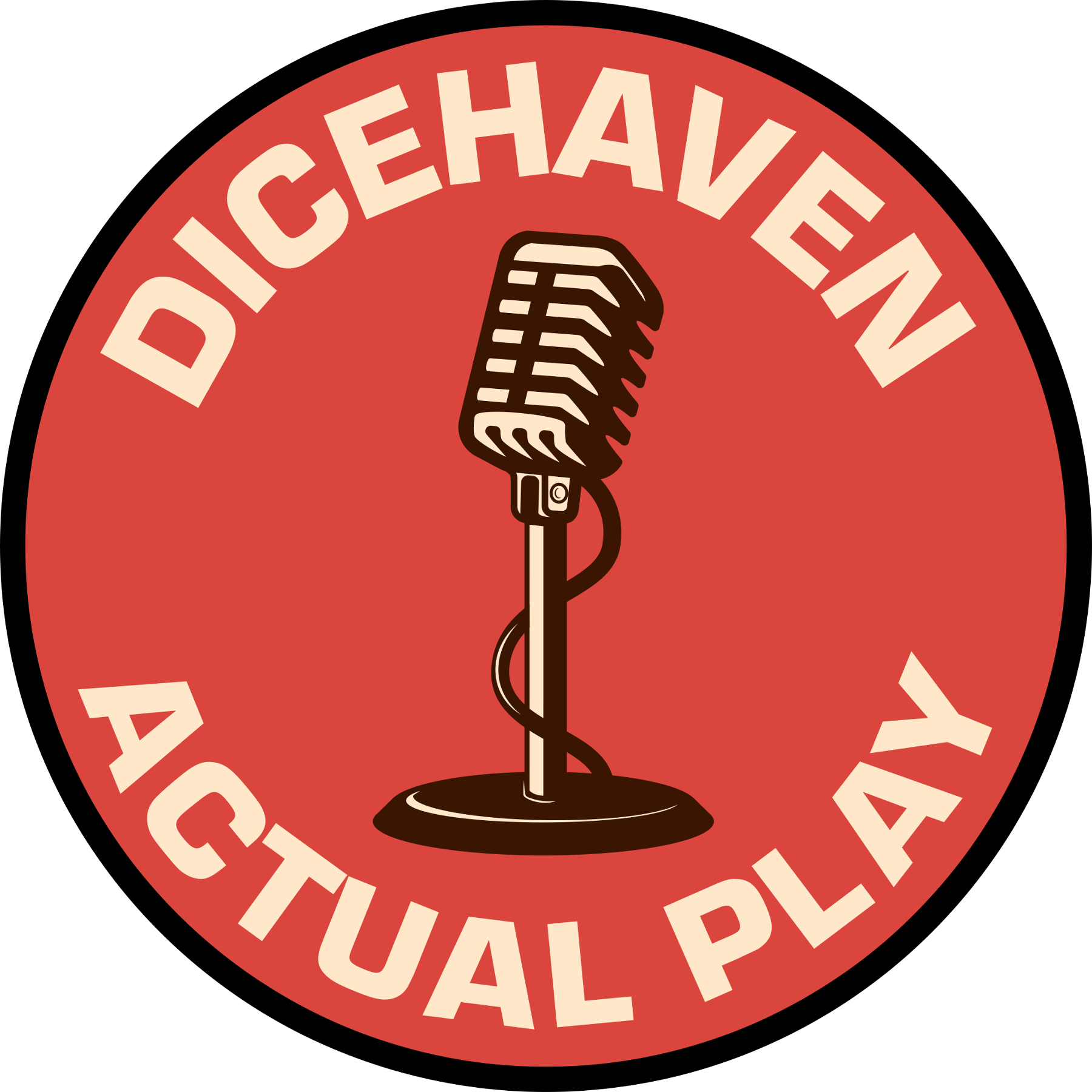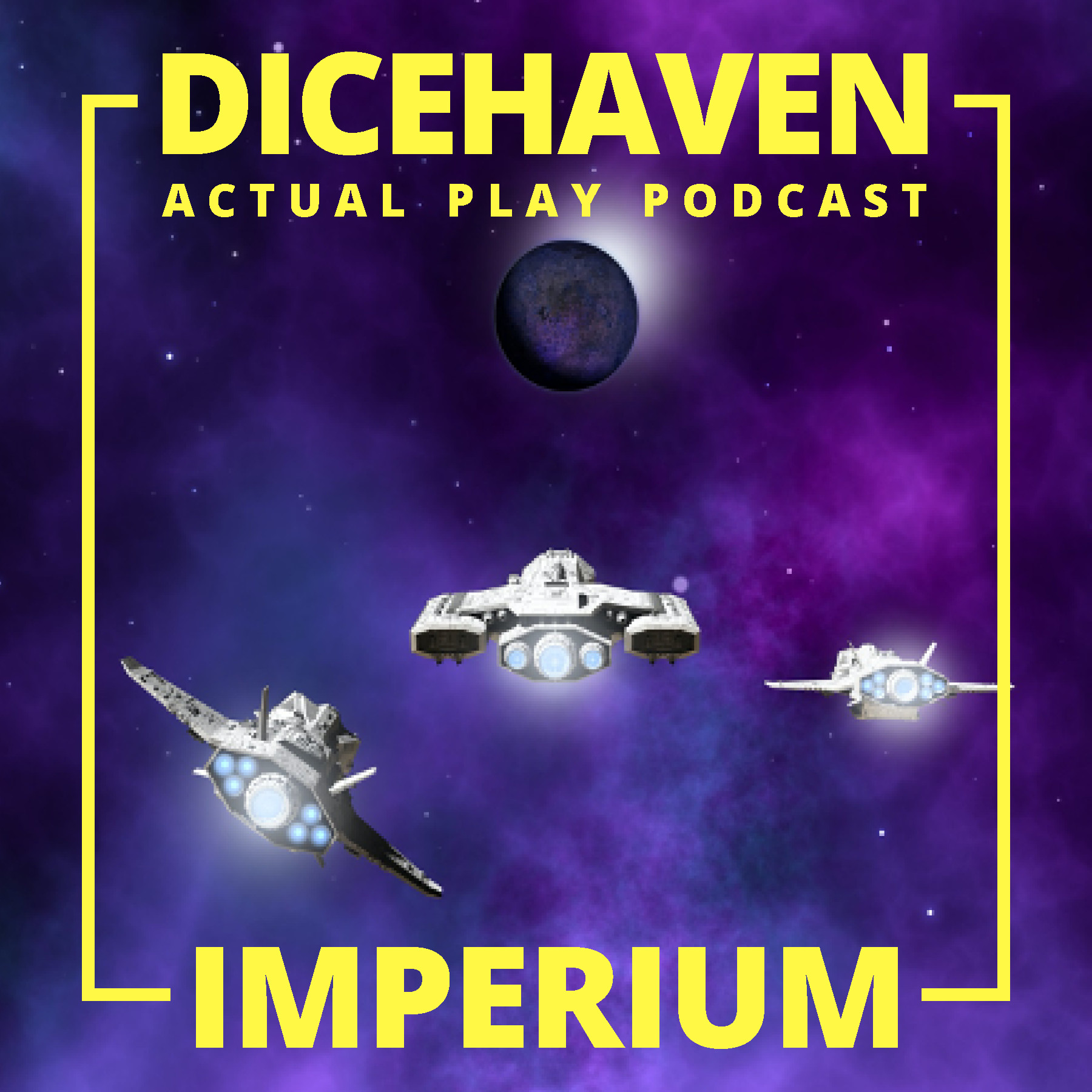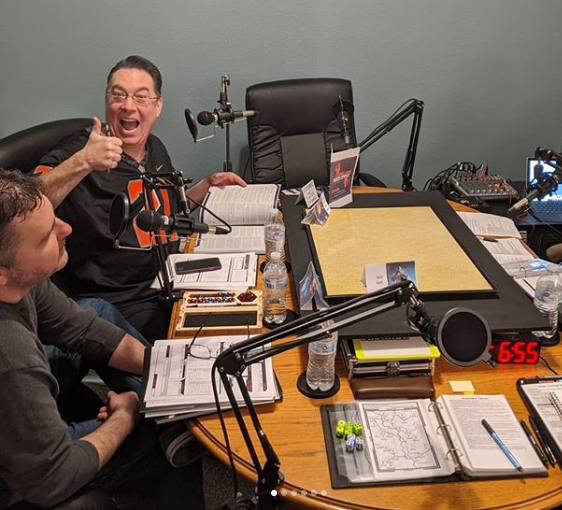I’ve run or played play-by-post (or ‘PbP’ for short) off-and-on for over 20 years. Back when I first started, it was Play-by-Email (PBEM), usually using a group listserv to send group emails. Things have progressed in 20 years! Two platforms that have take PbP to the next level are Discord (by adding the DiceMaiden (dice rolling) and Tupperbox (alias/avatar) bots) and GamersPlane.com. Both have their merits, but I am particularly enamored with GamersPlane.com.
On GamersPlane.com, check out what is play-by-post with getting started tips and this new members guide.
There are also numerous how-to videos, including this recent video on setting up Discord notifications when posts are made.
When I next run a PbP game, likely on gamersplane.com, here is a collection of play-by-post tips I have gathered over the years. What tips do you have?
General Considerations
- Adventure Follow-Through: Only join a game if you intend to see it through. We intentionally run short adventures. After an adventure concludes (usually 2-4 months of real-time) then that is a perfect segue to gracefully exit a game and retire or transfer your character in the fiction. That being said …
- Intro ‘Test’ Adventure: I like to start campaigns with a short adventure (a combat scene with some roleplaying) that lasts about 2 weeks. After that, this is a great off-ramp if you decide you need to bow out.
- Weekday Play: The GM will primarily post during weekdays. You may see some activity on the weekends, but it will be sporadic.
- Unavailability Notices: If you’re going to be out of pocket for more than 2 business days (such as a vacation), let us know in advance as much as possible. We’ll try to sideline your character in the fiction and then bring them back into play once you return. Post your vacation and days not available in an OOC thread.
Post Timing and Triggers
- 1-2 Posts Each Weekday: Try to check in each weekday and post at least once, even if it’s only a sentence or two. You can post a couple of times each weekday if you like, but try not to post much more than that so you don’t outpace the other players.
- 2 Business Day Wait Limit: If after 2 business days (not including weekends), there’s an action or decision that involves you and we don’t have your input, the GM will roleplay your character past that moment and keep things moving. Hopefully you return soon and you’ll regain control of your character.
- 7 Day Idle Limit: If you are absent for 7 calendar days without posting and without posting that you are unavailable, your character will be temporarily sidelined or run by the GM. If after 14 days, you are still absent, we will assume you have abandoned the game. Your character will either be retired, or given to another player to play.
- 2 Player Consensus: After a player has recommended an action, if it is seconded by another player, then we consider that to be the group decision. This keeps things moving without potentially waiting an extra day or two for a slower player to chime in.
Writing Quality Posts
- Post Length: A paragraph or two of in-character text is usually about right. In addition to that, you’ll also be posting out-of-character questions, conditional actions, and dice rolls.
- Post Formatting; Use third-person present tense. Bold character dialogue. Use italics for internal thoughts (which will be first-person tense). Use the OOC button to write out-of-character text. Reread your text before you post to catch grammar and spelling issues, and use a spell-checker when possible.
- Follow Character Guidelines: Make sure your character has a setting-appropriate, high-resolution image. Use a GM-approved avatar for your character (setting-appropriate and not a Hollywood star that is recognizable). Watch instructional videos (if needed) to learn how to view character sheets and select individual characters as the speaking character when posting.
- Conditional Actions: To keep things moving, post your intentions OOC with some if/then statements if needed. Go ahead and roll proactively when you think it might be needed; if the GM decides a roll wasn’t needed, the GM will ignore the roll.
Example: OOC: I wait a few moments to see if the lion draws any nearer. If it runs towards me, I’ll attack. [Roll 2D+2 Dex for initiative, Rolls 2D+3 Guns (Slug) roll to attack, I will dive for cover towards the rocks nearby if attacked for a DM-1 on my next action]. If the lion doesn’t attack, I’ll inch my way slowly backward and then try to flee. - Keep the Action Moving: If in doubt, take action. Move the story forward (while also giving others a chance to respond). The GM will ignore rolls and retcon actions and situations as needed. That being said …
- No God-Modding: This is an old, play-by-email term. Don’t write dialogue for another character, and don’t move them around without permission. Assuming a PC in the same room sits down with you to eat at dinner is probably OK, but saying ‘Kevin runs through the airlock with me into battle’ is exerting more control than is polite.
GM Style
- Player Agency and Narrative Freedom: I give a lot of narrative control to my players to speed the game up and keep players engaged. Use common sense regarding the environment, knowing you have narrative freedom. If you think something would make sense in the environment that isn’t a big game-changing element, then that element is there. We’re in an theater? You can tell us what you do with the overhead lights, how you get backstage, or how you try to charm an usher. We’re in an alley? Then there can be a dumpster, a fire escape on the wall, and a quirky homeless guy. No need to ask the GM, unless it’s a big story-changing elements (e.g. you can’t summon an army of robots to save you from the bad guys, or proclaim that you’re secretly the galactic president in disguise — ping the group out of character to get into big story changes like that).
- Montages: When things slow to a stopping point, or a junction in the story when it makes sense to fast-forward a bit, I’ll take over the story a bit and advance the timeline, telling you what happens. You all agreed to jump to another star system and look for another job for your spaceship’s crew? I’ll narrate how you got there, what it looks like, and the jobs that are there. Play by post is a slow medium, so occasional montages like this will keep the pace going.
- Retcons: If we decide something doesn’t make sense, or take an action based on a misunderstanding of the rules, we may do a retcon to change what happened. Feel free to suggest rectons too! The GM needs help in running the game and keeping the story consistent and fun.
- QuestWorlds Rolls: When using QuestWorlds as the PbP rules system, I will be fluid in when I set and roll the resistance. Often this will be after players state what they are doing and they roll, but sometimes I may announce and roll the resistance in advance. I’ll choose whichever approach keeps things moving and makes narrative sense.
Group Communication
- Strong OOC Communication: The GM and players should be in frequent communication about their questions, their thoughts, and questions. Did a scene seem really cool? Post in the OOC thread giving kudos for some great roleplaying. Frustrated about something in the story? Sometimes it’s best to message the GM privately, but you can also post to the entire group in the OOC thread if it makes sense. It’s important that everyone have fun in the game.
- Character Actions vs. Player Intent: Remember that it’s just a game. If you want your character to be rude to another player character (maybe they are a demanding Klingon insulting a passivist character species), post in the OOC thread to make sure they understand it’s just roleplaying and in character. Better yet, clear it with the other player beforehand. In the medium of text it’s sometimes hard to gauge intent, but remember that on the one hand, it’s just a game, and on the other hand there are real people you’re playing with who could get hurt if you act out against their character without their consent.




Recent Comments